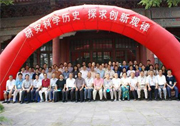| 中文题目: | 蒋介石《中国之命运》与中央研究院的回应 | ||||||
| 英文题目: | |||||||
| 作 者: | 郭金海 | ||||||
| 刊物名称: | 自然科学史研究 | ||||||
| 发表年度: | 2012 | ||||||
| 卷: | 2012,31 | ||||||
| 期: | (2) | ||||||
| 页码: | 180-200 | ||||||
| 中文摘要: | 《中国之命运》是1943年蒋介石推出的一本国策性著作。蒋于此书提出文化、经济与国防三体合一的建国计划。该计划的重点和先务是经济建设,而经济建设以工业化为当务之急,重点是实施实业计划。4至8月,中央研究院在国防最高委员会秘书厅的通令下围绕此书开展两次活动。参加活动的研究所主要对蒋在实业计划中轻忽农业、偏重应用科学提出意见;为配合实施建国计划,尤其实业计划,结合自身工作研拟了实施办法。自1943年起中央研究院注意加强与国家和社会实际急需问题有关的应用科学研究,在一定程度上导因于此书。1944年蒋于此书增订本对相关内容的增改与这些意见有关。蒋与中央研究院之间的互动影响,蕴含了国家与中央研究院互有所依而又保持一定张力的复杂关系。 |
||||||
| 英文摘要: | Published in 1943, China’s Destiny is Chiang Kai-shek’s monograph on national policy. In the monograph, Chiang proposes a nation-building plan, which integrates the three parts of culture, economics and national defense into one system. The focal point and urgent task of the plan are economic construction. At the same time, economic construction as industrialization as a matter of top priority, whose key rests with the implementation of industrial plan. Under the orders of Office of the Secretary of the Supreme National Defense Council, Academia Sinica carried out two activities about the monograph between April and August in 1943. The main suggestions made by the institutes of Academia Sinica taking part in the activities consisted of the neglect of agriculture with emphasis being laid on applied science in Chiang’s industrial plan. In order to support the implementation of nation-building plan, especially the industrial plan, the institutes taking part in the second activity worked out the implementation methods related with their research and other works. To a certain extent, China’s Destiny caused Academia Sinica to pay more attention to the research of applied science since 1943, which was related with actual urgent problems in the state and China’s society. Chiang’s modification for the relevant content in the revised and enlarged edition of China’s Destiny in 1944 was related with these suggestions. The interactive effects between Chiang and Academia Sinica implicating the state and Academia Sinica had a complex relationship that the state and Academia Sinica were to some extent interdependent, but tension still existed to a certain degree between the two sides. |
||||||





